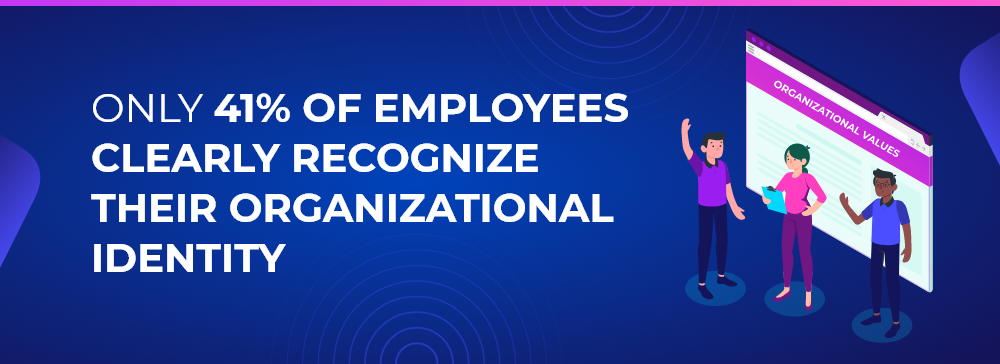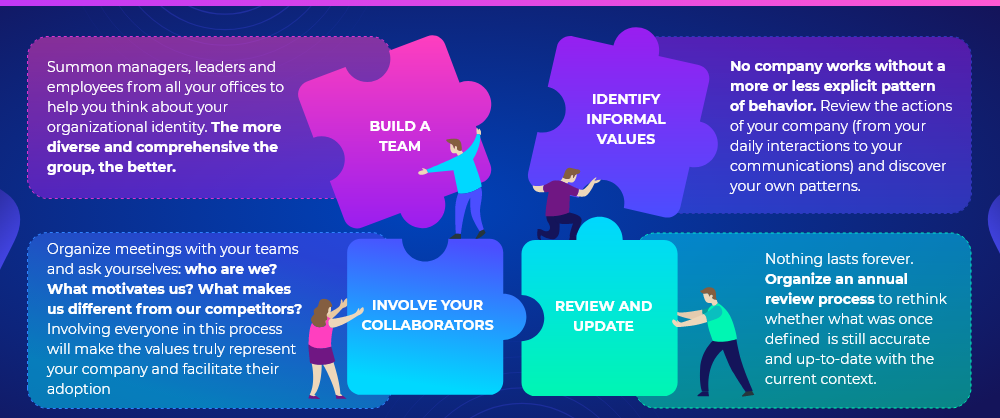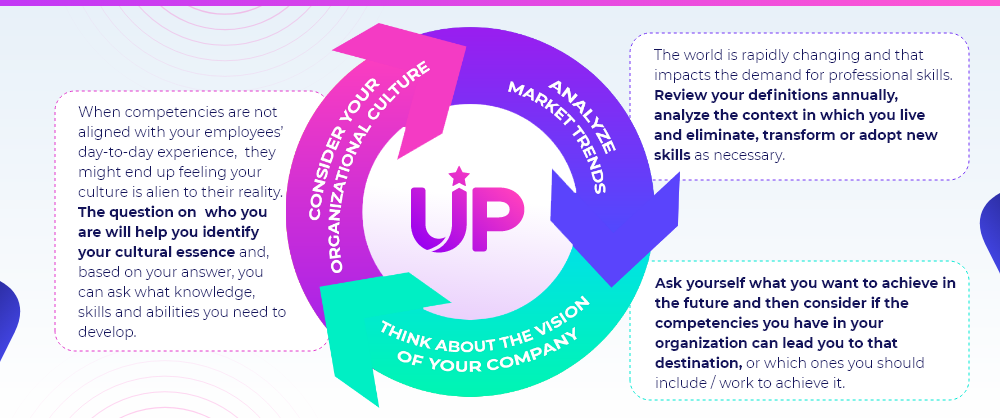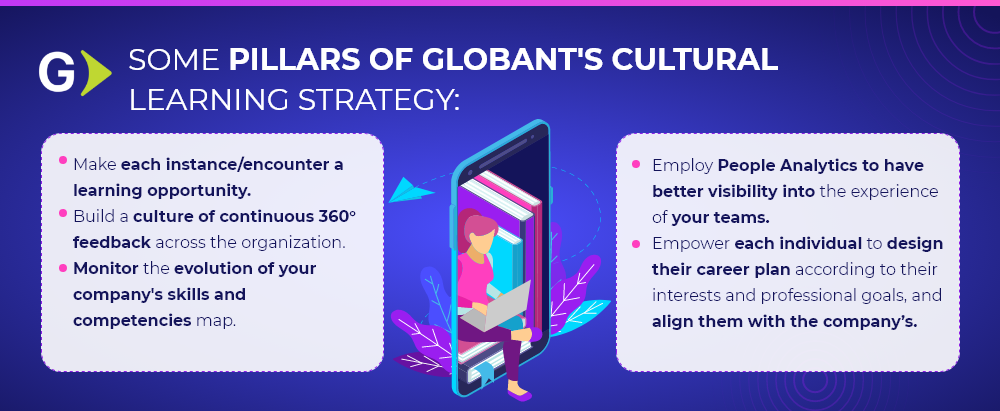Organizational Values Vs. Competencies: how to use them to promote your culture
Written by Florencia Paez
If we asked our readers to define what their company does, everyone would have a clear straightforward answer. Now if the question was why they do what they do, would their response have the same clarity? And more importantly, how does their everyday work relate to the organizational values and competencies of the company?
Organizational values help us understand why we do things a certain way, which is essential to determine who we are as a company and what makes us different from the rest. However, nowadays only 41% of employees have a clear understanding of their organizational identity.

By identity, we mean organizational culture: habits, behaviors, and actions that make each company unique. Although values have a significantly positive impact on culture, many companies still have not defined them; or even worse, they confuse them with the competencies they seek to develop among their teams.

We know that defining organizational values and competencies that reflect who you are as a company can be challenging – especially when today’s changing scenario makes you frequently re-evaluate them. That’s why we’ve put together this article with ideas to help you successfully establish them and enhance them.
Difference between organizational values and competencies we want to develop
Organizational values generate a sense of purpose among your teams, improve the bonds between colleagues and promote commitment to your company. That is why it’s commonly said that the core values of an organization are the fundamental pillars of a culture, since they serve as a guide for our daily actions, they foster motivation, and drive us towards our goals.
– Google: Learning, success, and inclusion.
– Apple: Excellence, focus, development, and innovation.
– Globant: Inclusive and diverse, be kind, team player, constantly innovate, excellence in your work, think big, and have fun.
Organizational competencies, on the other hand, imply the knowledge, abilities, and different skills that a person has (or must develop) to carry out their daily tasks. They mean much more than a simple “know-how” or a technique: they make up our capacity to carry out a job.
– Innovation
– Leadership
– Teamwork
But … how to make the difference between them?
Competencies are observable actions that must be aligned with organizational values. This can generate confusion, as they are likely to coincide. So, how can we make the difference between them? It’s simple: competencies can be measured but values cannot. Additionally, a value is usually linked to what (is important) and a competency to how (we do things).
You may still wonder why it is so important that you have them both well defined and differentiated. Suppose you have a clear set of values but you have not defined your skills: it will be difficult for your employees to understand their purpose and the ideals that represent your company. What if you have defined your competencies but not your values? Chances are, you will have a hard time setting goals and building the culture you want for your organization.
Get Things Going
As we mentioned earlier, values and competencies are complementary, that is, they need each other. And while there is no magic recipe to create them, it is important that you consider who you are as an organization, what your goals are, and that you are willing to do to keep them updated and challenging. This last point is crucial since it will allow you to work on a fundamental keystone for any company: its ability to adapt and keep updated – especially in these challenging times. Below you will see some tips that you can implement when it comes to defining your values and competencies.
Defining Values
Organizational values are your guiding light, but they are not static. The VUCA context, filled with Volatility, Uncertainty, Complexity, and Ambiguity, employees’ changing interactions, or our own organizational growth will probably lead to redefining your values. Re-evaluating what we want for our organization is just a natural process that we must eventually do.

Defining Competencies
Although it is true that competencies are the capacities, knowledge and organizational skills that we have to carry out a task efficiently, there is no perfect formula when it comes to establishing which ones we want to prevail in our company. This is where relating them to our values allows us to better understand what we are looking for and make more accurate decisions. We recommend that you bear these three factors in mind when you think about your skills.

Bonus tips: how to make your definitions a reality
Only when your values and competencies begin to be experienced daily in your company, can you say you have achieved a strong organizational culture. Here are three ideas that you can use to get everyone to embrace your values and promote the competencies you are looking for in your teams:
- Communicate every step: effective communication makes everyone understand how the decisions you make align with your vision. For example, if you propose to your collaborators to work on their innovation, they must first understand how this is linked to your values. Make it explicit why your employees’ work connects with the success of your organization and you will see how committed they are to its development and growth.
- Reinforce behaviors thanks to recognition: Recognition is a practice that highlights good actions and puts the focus on those who represent what you want for your company. Currently, there are digital recognition platforms such as StarMeUp, which in addition to helping you strengthen your values, provides you with predictive data so you can analyze your work dynamics in depth. There’s no better way to understand how your values are adopted than by analyzing how they are exchanged throughout the organization.
- Use continuous 360 ° feedback: feedback allows you to focus on your employees’ development by identifying their strengths and areas for improvement. You can further enhance this process by using technologies such as the StarMeUp performance management module, which helps you combine feedback information from multiple roles and areas along with the results of your teams’ performance evaluations. This way you can have an extensive and comprehensive map of skills and competencies within your organization.
Redefining the formula for success
As times change, so do the values of our company and the skills required from each team, therefore, transformation is a must. The future of work requires increasingly flexible and adaptable organizations, which means that we will all have to periodically rethink what we do, how we do it, and what we need to achieve our objectives.

However, neither your values nor your competencies will go beyond paper if they are not effectively embraced by your people. Through the active involvement of your employees in each step of this process, you will ensure that everyone understands what you want to modify and why it is important to have it done, which will consequently make them feel more committed to the expected results.